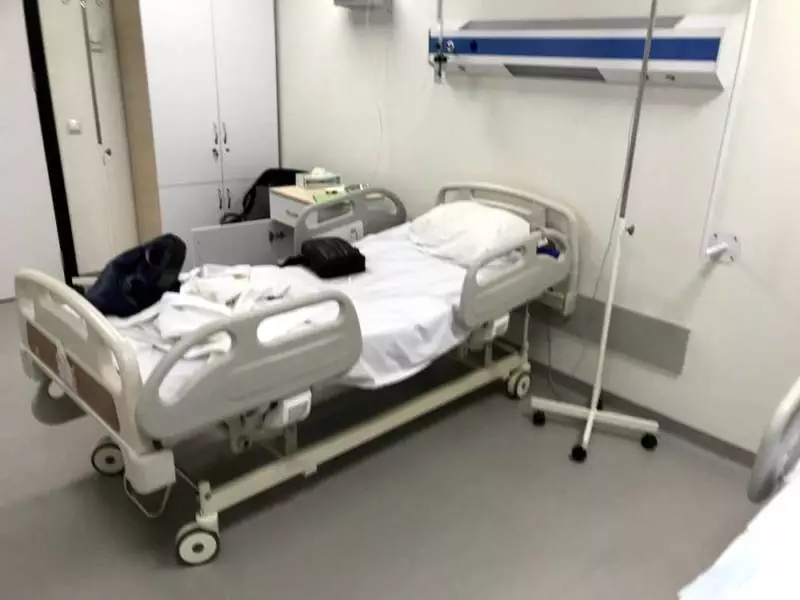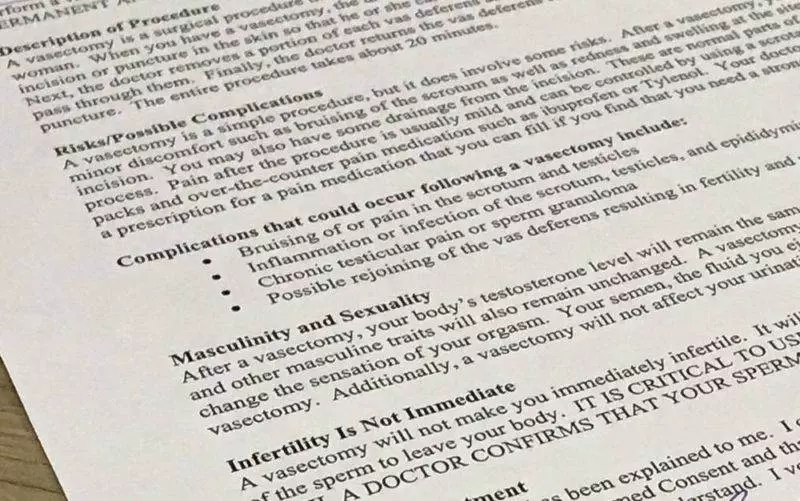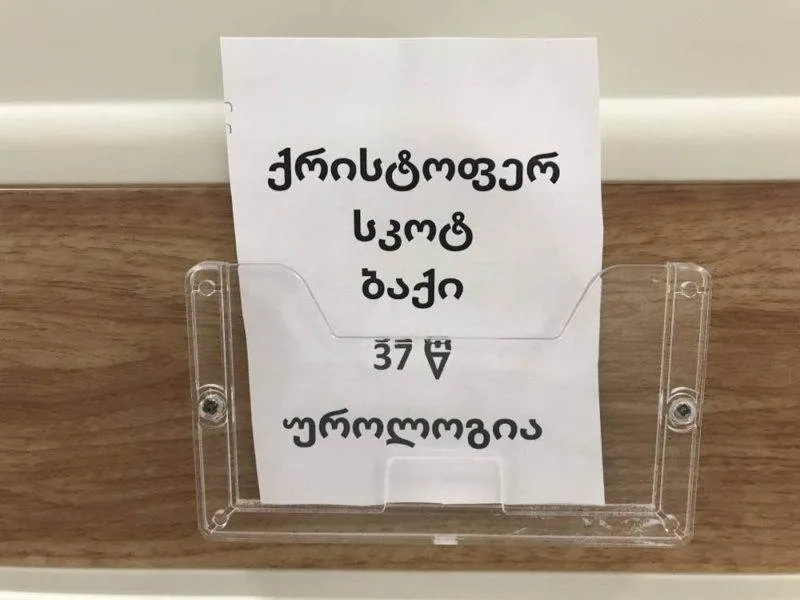Table of Contents
The start of this story is far less interesting than the rest of it, but every vasectomy tale needs a beginning.

In 37 years of life and 6+ wonderful years of being a husband, my / our desires to be parents have never existed. It became clear that a vasectomy would be the best way forward, and there’s no time like the present.
CAUTION: this is a pretty personal story with lots of medical bits inside, but we’re safe for work here. No pictures of anything medical or personal, because obviously. Feel free to move on if it’s not your cup of coffee.
The journey starts, as it often does, with internet research. I’m in Georgia at the time, a country supposedly attempting to grow its medical tourism field, so that’s a promising start. A few misfires involving websites made around the turn of the century and Google searches that returned stories of medical tourism later, I finally found a hospital explicitly offering vasectomies.
The English-language site worked fairly well, and I made an appointment via email as directed by the website. (Since my goal here is not to promote this particular hospital for reasons to come, it will remain unnamed. Suffice it to say this is one of the largest hospitals in Georgia’s capital, Tbilisi, not a podunk clinic in the middle of nowhere.)
Georgia is still very much living in (and suffering from) a Soviet-era legacy that affects most institutions. There seems an emphasis on tidy paperwork, for example, or police officers attempting (and failing) to direct traffic when the traffic lights are working perfectly because of a need to look busy – two of any number of holdovers from a former generation’s way of thinking.
The first issue came immediately after sending the initial problem: an auto-responder from the single contact person with a more generic email address to send a message to. OK… copy, paste, sent. I received a response fairly quickly, and scheduled an appointment for the next day – from 2pm to 3pm.
A follow up email confirmed the location, and the person responding, a coordinator of some kind, said she’d be waiting for me by the entrance. I was impressed, to say the least. Appearances are deceiving, however.
The first vasectomy appointment
Arriving at the hospital was easy enough – it’s marked on Google Maps and is a short walk from a subway station. The information desk pointed me to the specific room for the doctor, where I walked and went ‘wait a second… usually you need to register or something…’ I assumed the doctor would usher me back to the correct place… except there was no one in the room. The coordinator was nowhere in sight. A quick e-mail was responded to in minutes, saying she on her way…
An older man entered the room in question as though he belonged. I followed him in as he sat at the office chair and announced myself as his 2 o’clock. His puzzled expression indicated was that he was not the doctor. I left and walked back to a couple of bored staff members sitting behind computers. It ended up being a payment desk, though there was no sign to indicate that.
Neither responded affirmatively to a ‘do you speak English’, but one of them used their ‘phone a friend’ option to get out of the situation. Initially I thought the woman that showed up was my contact person, and she responded to the coordinator’s name. When the real coordinator showed up eventually, she handed me over as if nothing was the problem. Never mind that what I saw of their ID’s appeared to be entirely in Georgian, and there was no way to know I was actually talking to the right person…
The process for getting registered was straightforward enough – just a matter of taking my ID and punching things into their computer. This process required meticulous stapling (I can’t help but wonder if they’re tested on this when they apply for the job). A lot of rapid fire Georgian between my coordinator and the person registering the info, although the former insisted there wasn’t any problem. Maybe it’s just a bunch of harmless chit-chat between coworkers, I don’t know.
Will give them the benefit of the doubt, though at one point no fewer than four people were seen hovering around the computer as the worker registered my ID into their system… (Pro-tip: hospitals seem to prefer your passport to any other type of ID. They were able to work from a copy I always carry with me, though.)
With papers assembled and a folder receiving the handwritten treatment, we’re off to see the doctor, AKA the head of the Urology department. I was expecting a few questions from my internet research… instead, the doctor just simply said ‘I’m listening’. OK, weird… I related a story I’ve told a few times – during the third date with my now-wife, I asked her if she wanted kids. She said ‘no’. I asked ‘are you sure?’, and she said ‘yes’. I then joked, ‘great, now we can continue to a fourth date’…
The doctor and I talked for a few more minutes, then got to the cost (I’m told $670 USD by the coordinator) and some logistics. I would need a pre-operative workup to get the anesthesia right. There are a couple of options for anesthesia (‘local’ or ‘spinal’), and supposedly they cost the same. This seems odd, but apparently it has something to do with how the surgery is covered by insurance… ‘I’m not insured, this’ll be paid out of pocket,’ I replied. It still wasn’t crystal clear, but I’m told the ‘spinal’ version means I won’t feel a thing.
One common thing I read about was the need to do a follow-up check, at least with vasectomies done in North America and elsewhere. One wants to confirm one’s sperm count is actually zero because engaging in…. extracurricular activities… so how does it work? To paraphrase the doctor, ‘It’s not necessary’, came the reply, since they make a slightly larger incision. That level of sureness was… not actually all that reassuring. In any case, this follow-up check usually occurs around two months after the operation, and I’ll be in another country by that point…
Alright, so let’s talk about this pre-operative workup. How much does this cost? My coordinator didn’t know, but the doctor said around 250 lari (about $93 USD). I’m told this is part of the overall operation cost, not something extra on top of it. OK, fair enough. This can be done the morning of the operation… hang on a second. You want me to come into the hospital for what’s often advertised as a outpatient procedure — an operation that takes no more than a half an hour — and remain there for essentially the entire day? Oh, no, you can come in in the morning, then leave and return…
Yeah, that’s convenient — this hospital is easy enough to reach, but it does take awhile to reach. ‘Any chance to do this now?‘ I asked. Oh… well… have you eaten in the last two hours? (I skipped lunch because I was running a bit late to the appointment.) No? Well, then, sure, we can do that now — let’s just go ahead and get the payment made… This necessitates another trip to another payment desk… but wait, where did that folder so meticulously put together go? My coordinator doesn’t have it. It wasn’t given back to me. Meh – it’s not necessary, apparently, and no one asked for it the rest of the visit. Who knows?
It’s here where I learn this particular procedure costs more than the doctor stated. It’s not much (about another 100 lari, or $37 USD, give or take), and it’s still a part of the overall cost, so it’s not like it’s more out of pocket. I’m just paying more now and a bit less later. It just… irking when the people I’m supposed to trust doesn’t know what something is supposed to cost, doesn’t care to look, then gets defensive, shrugs, and acts like it’s not a big thing… Dammit Jim, I’m a Westerner, not a walking ATM…
This particular pre-operative workup required some blood (drawn once, then injected into five or six smaller tubes, presumably for five or six different tests), some urine (always fun to pee in a cup, said no one ever), and an electocardiogram (ECG). First time for everything, I guess.
With this done, my coordinator says things are in order, and we’ll sort out a few details via e-mail.. I’m told not to eat or drink anything for six hours prior to the anesthesia. We schedule the vasectomy for 5pm and to arrive at 3pm to begin prep. The ‘spinal’ option will leave me awake, according to the e-mail, and I’m not told to bring anything or do anything else.
The day of the surgery
My wife joins me to ensure the appropriate medical questions get asked (since she’s had a bit more experience in hospital / medical institutions) and obvious moral support.

The coordinator was waiting for us at the entrance, and we eventually got registered for the hospital. I say eventually, because the one person apparently able to punch stuff on the computer is busy with another customer. How / why no one else is available to do this is unclear…
Eventually, I was presented with an Informed Consent form in English (a pretty standard form to put expectations into plain language, and a pretty normal sort of thing to expect), and two pages of tiny, single-spaced Georgian. ‘Just sign,’ the coordinator says, despite knowing I can’t read / understand Georgian. After a few minutes of (mostly) polite back-and-forth, an English translation is provided. It’s basic boilerplate as expected, but is this really how one of the biggest hospitals in the country acts when it’s trying to develop its medical tourism industry?
Paying was straightforward enough, and after another round of paperwork and stapling, we’re off to another floor. Laura is asked to wait in the waiting room while I get ushered into the hospital side of things (as Laura later explained, ‘this is outpatient surgery, but while you’re getting the surgery you’re an inpatient’)…
We all put some plastic booties on your shoes for sterility, then eventually find our way to my room for the stay… which is still in cleaning… ‘Five minutes’ comes the short translation of an otherwise lengthy back-and-forth in Georgian… ‘Five minutes’, it seems, is a saving-face sort of code for ‘soon-ish’ similar to Thailand, South American, and other countries where time is a rather fluid concept…

A little over an hour after arriving, I’m checked in, in my room, and waiting for the next step. A nurse comes in and says a word that puts fear into most men’s hearts — ‘catheter‘. I say ‘excuse me?’, as it becomes clear she’s simply gearing up to put an needle in my arm for IV’s later on… Huge sigh of relief.
I get dressed in a hospital shirt and undressed from the waist down (covered with a sheet, naturally), then the nurse entered again to wrap up my legs with elastic wrap. It wasn’t clear why this was happening for a vasectomy, but I was later told it’s done to prevent thrombosis (a blood clot inside a blood vessel, a pretty big issue that can also happen on long flights).. Just trust the process, I thought.
The actual procedure
The time came eventually, but before being wheeled out, I needed to part with my rings and my glasses. Not sterile or might interfere with other stuff – who knows? They never said. I got wheeled into a waiting area, where eventually the anesthesiologist came over, asking about allergies, asthma, and ‘dee-uh-bet’… It took a second before I realized he was asking about diabetes, despite having done the complete blood work-up already and seen the results… He eventually asked me to sign his folder (at least a couple of pages entirely in Georgian). Oy vey…
The operating room is warm, and I count no fewer than six people in the room gearing up for the surgery. First comes the anesthesia, which needs to be injected very near my lower spine. I’m asked to sit up over the edge of the bed, and a nurse holds / braces my shoulders…
Damn that needle hurt!
Between that fun little injection and not having eaten / drank anything for (now) almost 8 hours, I started seeing spots and feeling a little light-headed…. Not my finest moment, but an oxygen mask got snapped on my face in seconds and the feeling passed quickly. I’m laid back on the bed, and though I’m not told how long it’ll take for the anesthesia to kick in, it doesn’t take long… maybe 10 minutes…
Post-operation
You know how when you’re laying in a bed and you’re feeling sleepy? You aren’t necessarily aware of the exact moment you fall asleep, and it really doesn’t matter all that much… At some point, the anesthesia took effect without me feeling it coming on. I come to and am told we’re all done. I’m groggy for a few minutes, and I try to get comfortable, remembering I was told the anesthesia would last about 3 hours.
As I’m being wheeled back to the waiting room, I do that fun little self-check — fingers work, legs work, I can feel everywhere… wait, what kind of awesome anesthesia was this?! I’m in no pain, and nothing is numb. I carefully feel over the area operated on, feel some gauze, and decide to let it be. Heaven forbid I pull at something still fragile (or worse, appear to be playing with myself in a hospital!).
I’m to wait an hour in this waiting area before I’m released to my hospital room, and without my glasses or anything to do, it’s a long hour. A nearby patient’s heart-rate monitor is beeping, so I pretend it’s a metronome and conduct in 4/4 time (I was a Music minor and took a Conducting class while in university).
Two nurses finally came and wheeled me back to the room, where I was told I could leave soon… but first, walk around the room for five minutes to ensure your legs are working fine. Trust the system. OK, sure. Bear in mind I still have a needle in my arm and wrappings around my legs, so ‘soon’ might be awhile…
After pacing the room, the nurse and coordinator came back in, finished some clean up, and I eventually discovered just how much iodine they managed to use (it stained the sheets and I still had quite a bit on my thighs). Some last minute questions – you may eat or drink immediately, but hold off on the alcohol for a week. I knew from research and the consent form that sperm is still present, so hold off on unprotected sex until you’re… erm, drained…
Now clothed and reassembled, the coordinator and I head back downstairs, where I find my wife and eventually return home… The story isn’t over yet, however — apparently, to enter the ward to reach my hospital room, my wife needed to deposit an ID. A sensible enough system… except when she decided to leave, the desk which held her ID had closed / locked up. No one bothered to find her, tell her, or indicate their hours in any way… She returned the following day to get it back, but this is at best an effect of less-than-optimal communication…
The verdict
OK, so I’m well aware of my privilege, my general lack of knowledge of hospitals / medical institutions, and I freely admit I’m far from a patient patient. My expectations were high, based on the following facts:
- I’m visiting one of the biggest hospitals in a country that’s supposedly working to improve its medical tourism
- I’m with a English-speaking coordinator to help expedite the process by my side every step of the way
- This is a simple, elective, outpatient surgery on an otherwise reasonably healthy (if a bit overweight) person.
The medical / surgery side gets a solid A (let’s say a 95 out of 100). All facilities appeared modern and functional, and with the exception of maybe a bit too much personal talk between the medical staff, everyone was dressed and acted like professionals. My only other quibble here was how some of the prevailing advice seen across the internet about vasectomies simply wasn’t being used here.
Dealing with the bureaucracy and paperwork gets a C+ (let’s say a 78 out of 100). It’s a reality no matter what sort of hospital you go to, They got the job done… eventually, but required visiting multiple people for lengthy, slow interactions. Paperwork disappeared and reappeared, but the only paperwork I took home were the receipts for payment.
The communication gets a D (let’s say a 65 out of 100). The coordinator failed to answer or didn’t intelligently answer around 80% of what I tried to ask her, even when speaking slowly and clearly. She would either nod her head or say ‘yes’ as if that answered the question, even when asked a non ‘yes-or-no’ type of question. Her written English in e-mails was fine, but spoken English is kind of important in situations like this as well — especially when it’s your job at the hospital.
My basic requests for her to explicitly say or translate what needs to be done weren’t understood. Instead, she assumed I knew what to expect, attempted to pantomime, or used words in a halting order (‘please… shirt…’ with a motion to take off my shirt as one example). In at least one case, I was lied to / given bad information by this coordinator. When asked if the ‘spinal’ anesthesia would knock me out or if I would be awake, she responded by saying I’d be awake. As you’ve already read, that wasn’t the case. This pissed my wife off, to put it mildly.
Of the various people I needed to speak to, the doctor that actually performed the surgery had the best spoken English. My wife correctly noted that when all is said and done, the doctor and their skill will matter more than anything else. One nurse was able to say what they needed to do (or explain what had been done) in English. Were it not for these two professionals, this score would have been an F.
The value for the money gets a D (let’s say a 65 out of 100). One considers medical tourism because there’s high-quality treatment cheaper elsewhere than in your home country. The availability of the doctor or the wait / delay may be another element, and perhaps you can use it as an excuse to a vacation to the country of choice. In any case, the price paid is only one part of the equation, but let’s take a closer look at this.
The money
All told, we paid 1,905 Georgian lari, or about $705 US from start to finish for the whole thing:
- 105 lari ($39) for the initial appointment
- 342 lari ($127) for the pre-operation work-up
- 1,458 lari ($540) for the surgery
- No follow-up checks were included in any of this, and it was claimed none were needed.
While prices for medical procedures are far from standard and not always easy to find online (way to suck, USA!), a fair bit of Googling discovers a number of price points:
- In various parts of the US: “From $350 to $4,000”, “Between $500 and $1,000”, “From $561 to $680”, and “anywhere between $0 and $1,000“.
- In Köln, Germany: $563 to $619 (“between € 500.00 and € 550.00”)
- In Bangkok, Thailand: between $548 and $609 (this particular hospital is one of a very few to even display a price on this site; most others simply say ‘price on request’)
- In Casablanca, Morocco: $612 (same site as above)
- In Kiev, Ukraine: $770 (same site as above)
- In Great Britain, about $610 (“Consultation £110 [and] Treatment £360*)
Yeah, I’m surprised, too. I was told by the doctor that few Georgian men get vasectomies, so it’s a fairly rare procedure… but I don’t see how that might change how much is charged…
A couple of huge caveats with the above: the exact techniques may vary, and it’s unclear whether these are the prices locals pay or whether they’re marked up as they’re marketed to foreigners… I was not a ‘medical tourist’. How insurance works for you (or doesn’t) is an entirely different story I’ll completely sidestep here. None of the sites above use the words ‘medical tourism’ to describe their offering, so this is the best ‘apples-to-apples’ comparison I can make. Also, something like this medical tourism site for South Africa makes it clear just how much the term ‘medical tourism’ jacks the price up…
The final word
There’s really very little I can recommend about this hospital, or about medical tourism in Georgia as a whole. Obviously, this is only one data point for one surgery at one hospital at a single point in time. This entire process took more time and effort than expected. I’m still glad I did it, but knowing what I know now, I might have waited to get it done in another country.
Over to you
Comments are open – stay classy people =)


